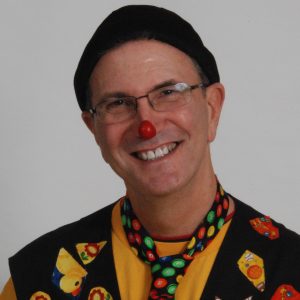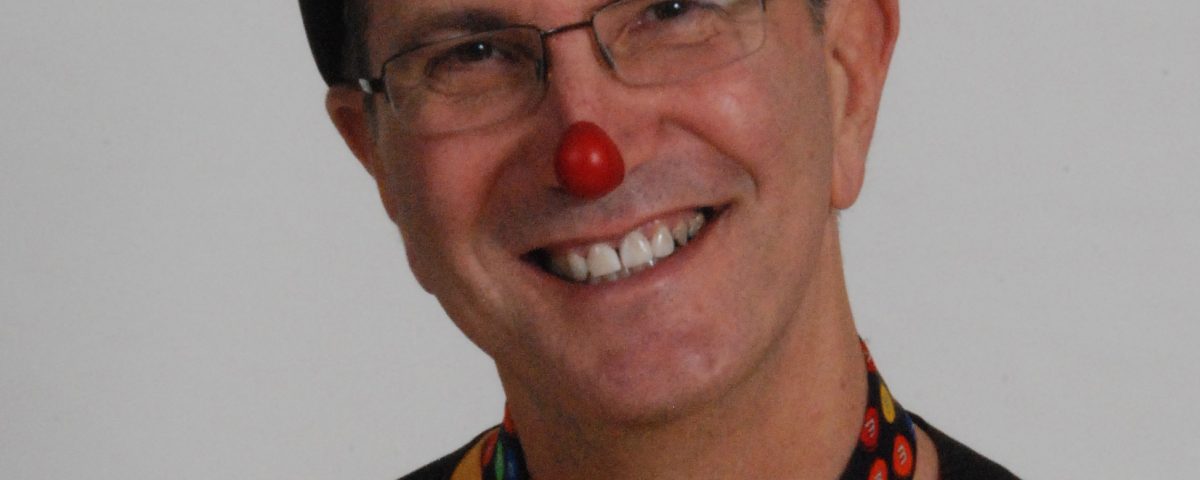 How long have you been a clown with the Troupe? 15 years.
How long have you been a clown with the Troupe? 15 years.
How did you hear about the Troupe? As a work benefit, I’d been offered a few sessions with a business coach. My business didn’t need assistance, but I was looking for a volunteer opportunity that would make use of other parts of me I felt needed expression. When asked what this might look like, I told the coach I’d like to combine interests and past experiences with kids, not-for-profit service, fun and the ability to shake off my everyday serious professional life. When she suggested hospital clowning, I was dumbstruck. I’d never heard of it, but was immediately hooked on the idea.
What inspired you to get trained and join? I met with then Troupe director Jeannie Lindheim, and it was just the perfect fit for what I was looking for. Kids, service, fun, using all these non-serious parts of myself. Timing was on my side. She’d been waiting to pull a new group of clowns together for a while, and was about to begin training shortly.
What has inspired you to remain with the Troupe? It never gets dull. Besides all the ways in which giving back through volunteer work always feels good, the actual work doesn’t feel like work. It can feel hard and tiring, but never routine. Remaining present and focused requires a certain level of concentration that I’ve become more skilled at over time, and it’s carried over and benefited me in other parts of my life. I’m continually challenged to develop my skills of improvisation and by “being in the moment,” becoming a better clown for the child. As a parent, I was continually reminded of how grateful I was to go home to a healthy child. And most importantly, hospital gigs are truly a lot of fun. The kids and their families just continually amaze with their capacity to put aside all the seriousness of whatever if bringing them to the hospital, and be playful. There’s nothing better than the sound of giddy laughter coming from a child’s hospital bed. It’s also an extraordinary group of people who volunteer with the Troupe, and I love my clown partners.
How has the Troupe changed through the years? The level of professionalism and expectations of clown skills has definitely been upped considerably. I have attended numerous workshops to hone my medical clowning, and feel inspired to continue to do so.
What wisdom would you give to someone who would like to be a hospital clown? Appreciate the joy and freedom of letting go of preconceived ideas of what should happen when you walk into the hospital room. Be present and responsive to who and what you are presented with. Don’t worry about failing. The most unexpected pleasurable moments are unscripted. Just like life outside of clowning!
What is your clown name? How did it come about? My formal name I.B. Fuddles but you can call me Fuddles. My clown persona is confused, definitely not limited to my clown, but he gets to express it more often.
What do you do for work? I’m a real estate broker, marketing residential properties in Brookline and Newton.
What is your favorite part of clowning? Partnering and the gigs.
Where do you clown mostly? I clown mostly at Floating Hospital for Children at Tufts Medical Center on the pediatric floors, BMTU & PICU.
Why do you think clowning is important for hospitalized children? The hospital is an alienating, frightening place for adults, let alone children who experience a total loss of control. Anything that offers empowerment and play, even for a short time, contributes to healing.
How do people respond when you tell them you are a hospital clown? It’s totally cool. Most start to view you through an entirely different lens.






